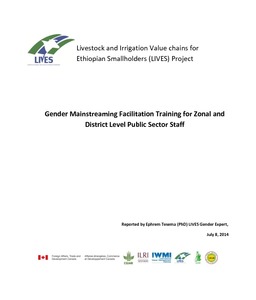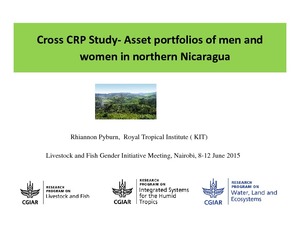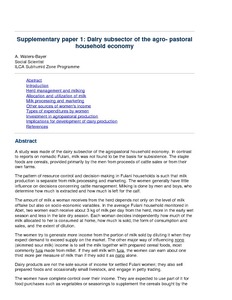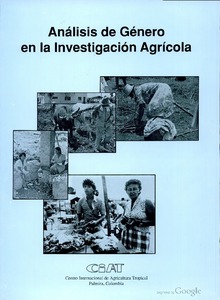mulher
AGROVOC URI:
Gender mainstreaming facilitation training for zonal and district level public sector staff, 19 May-20 June 2014
Gender roles and preferences in animal feeding technologies: A case from Mali
Cross CRP Study: Asset portfolios of men and women in northern Nicaragua
Dairy subsector of the agropastoral household economy
Reports findings from a study of spheres of influence of men & women, esp. as they affect the dairy subsector, in Fulani agropastoral households in Nigeria; with particular reference to decision making & control over herd management; milking; allocation & utilisation of milk; milk processing & marketing; household income from milk sale; womens' household expenditure and investment in agropastoral production. Analyses implications of these for development of dairy production.
Análisis de género en la investigación agrícola : Memorias de un taller interno, Palmira, Colombia 13-14 junio 1991
A review on production, marketing and use of fuel briquettes
A socio-hydrological approach for incorporating gender into biophysical models and implications for water resources research.
Men and women interact with water resources and landscapes in different ways, and there are frequent criticisms that little research is undertaken across disciplines to address this issue. Biophysical scientists in particular struggle with how to integrate “gendered” water uses into models that are necessarily based on prevailing laws and equations that describe the movement of water through the hydrological cycle, independent of social constructs.
Socio-Economic and Ecological Impact Study of Sustainable Land and Ecosystem Management in Shifting Cultivation Areas of Nagaland
A biodiversity project in Nagaland is improving the productivity and fertility of the jhum land and fallow areas. The increased productivity has spiked sales of products and the incremented farmer income substantially. The study also highlights how women in Nagaland have been empowered through the project.
Quick Guide to What and How: increasing women’s access to land
This quick guide gives a brief over view of the challenges regarding women’s access to land, outlines what needs to be done to increase women’s access to land and provides Sida with some entr y points for supporting processes where women gain access to land
Challenging the Property Rights of Women in India
This paper focuses on the enforcement of proprietary rights of women by the Indian courts and their endeavor to interpretlegislation in favour of marginalized women.
Women and Land Rights
There is a direct relationship between women’s right to land, economic empowerment, food security and poverty reduction. A gender approach to land rights can enable shifts in gender power relations, and assure that all people, regardless of sex, benefit from, and are empowered by, development policies and practices to improve people’s rights to land. This brief gives an overview on how to consider gender aspects in projects and programmes addressing land rights.








